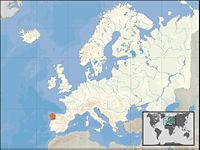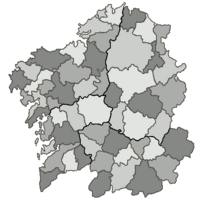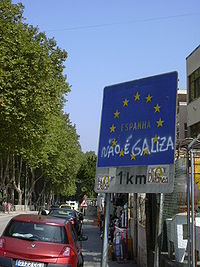
Galician nationalism
Encyclopedia




Nation
A nation may refer to a community of people who share a common language, culture, ethnicity, descent, and/or history. In this definition, a nation has no physical borders. However, it can also refer to people who share a common territory and government irrespective of their ethnic make-up...
. The political movement referred to as modern Galician nationalism was born at the beginning of the twentieth century from the idea of Galicianism
Galicianism (Galicia)
Galicianism is a political ideology of nationalist character whose objective is the defence of Galicia and its culture by the means of the establishment and strengthening of its own institutions.-Origins:...
.
Ideology
Historians, geographers and ethnologists recognize the existence of a Galician ethnic groupGalician people
The Galicians are an ethnic group, a nationality whose historical homeland is Galicia in north-western Spain. Most Galicians are bilingual, speaking both their historic language, Galician, and Castilian Spanish.-Political and administrative divisions:...
, forming a singular unit in a specific territory. However, this is a wide conceptualization that in political terms allows many possible variants. Inside Galician nationalism two main ideological currents can be found:
- Autonomist: claims for an extended autonomy of Galicia, further devolutionDevolutionDevolution is the statutory granting of powers from the central government of a sovereign state to government at a subnational level, such as a regional, local, or state level. Devolution can be mainly financial, e.g. giving areas a budget which was formerly administered by central government...
and (in occasions) the transformation of SpainSpainSpain , officially the Kingdom of Spain languages]] under the European Charter for Regional or Minority Languages. In each of these, Spain's official name is as follows:;;;;;;), is a country and member state of the European Union located in southwestern Europe on the Iberian Peninsula...
into a federalFederalismFederalism is a political concept in which a group of members are bound together by covenant with a governing representative head. The term "federalism" is also used to describe a system of the government in which sovereignty is constitutionally divided between a central governing authority and...
state where Galicia would eventually achieve self determination.
- Pro-independence: campaigns for immediate and total independenceIndependenceIndependence is a condition of a nation, country, or state in which its residents and population, or some portion thereof, exercise self-government, and usually sovereignty, over its territory....
from SpainSpainSpain , officially the Kingdom of Spain languages]] under the European Charter for Regional or Minority Languages. In each of these, Spain's official name is as follows:;;;;;;), is a country and member state of the European Union located in southwestern Europe on the Iberian Peninsula...
. This is however supported by a minority of the population.
Both autonomists and independentists have points in common such as the defence and promotion of Galician culture and language
Galician language
Galician is a language of the Western Ibero-Romance branch, spoken in Galicia, an autonomous community located in northwestern Spain, where it is co-official with Castilian Spanish, as well as in border zones of the neighbouring territories of Asturias and Castile and León.Modern Galician and...
(where some of them defend reintegrationism
Reintegrationism
Reintegrationism is the linguistic and cultural movement in Galicia which defends the unity of Galician and Portuguese as a single language. In other words, it postulates that Galician and Portuguese languages did not only share a common origin and literary tradition, but that they are in fact...
with Portuguese
Portuguese people
The Portuguese are a nation and ethnic group native to the country of Portugal, in the west of the Iberian peninsula of south-west Europe. Their language is Portuguese, and Roman Catholicism is the predominant religion....
). Both also argue for the official and unequivocal recognition of Galicia as a nation and the defence of Galician speakers outside administrative Galician territory, namely in Galician speaking areas of the Spanish regions of Asturias
Asturias
The Principality of Asturias is an autonomous community of the Kingdom of Spain, coextensive with the former Kingdom of Asturias in the Middle Ages...
and Castile and León
Castile and León
Castile and León is an autonomous community in north-western Spain. It was so constituted in 1983 and it comprises the historical regions of León and Old Castile...
.
It is often considered that the ideological framework of contemporary Galician nationalism was set in Castelao
Castelão
There are two association football stadiums nicknamed Castelão:*Castelão , located in São Luís, Maranhão, Brazil*Castelão , located in Fortaleza, Ceará, Brazil-Other:...
's key work Sempre en Galiza (lit. "Always in Galicia"), published in 1944.
Political nationalism in society
Galician nationalist candidates received 19% of the vote in the Galician General Elections of 2005 and 16% in 2009.From 2005 to 2009 Galicia was ruled by a coalition government between the socialist Socialist Party of Galicia
Socialist Party of Galicia
The Socialist Party of Galicia is a centre-left political party in Galicia, Spain. It is the Galician affiliate of the Spanish Socialist Workers' Party . It defines itself as a Galicianist and social democratic party.-External links:Official*...
(PSdeG-PSOE) and the nationalist Galician Nationalist Bloc (BNG)). Unlike in other Spanish autonomous communities the conservative and pro-Spanish People's Party of Galicia
People's Party of Galicia
The People's Party of Galicia is a centre-right political party in Galicia, Spain. It is the Galician affiliate of the Spanish People's Party....
(PPdeG) includes galicianism
Galicianism (Galicia)
Galicianism is a political ideology of nationalist character whose objective is the defence of Galicia and its culture by the means of the establishment and strengthening of its own institutions.-Origins:...
as one of its ideological principles. Even the Spanish Socialist Party has a quite strong regional flavour in Galicia. This issue somehow explains electoral behaviour in Galicia and why nationalist parties have a reduced representation when compared to Catalonia or the Basque Country, as voters in Galicia may choose to go for Spanish parties promoting Galicianism depending on the circumstances. Spanish parties in Catalonia
Catalonia
Catalonia is an autonomous community in northeastern Spain, with the official status of a "nationality" of Spain. Catalonia comprises four provinces: Barcelona, Girona, Lleida, and Tarragona. Its capital and largest city is Barcelona. Catalonia covers an area of 32,114 km² and has an...
and Basque Country
Basque Country (autonomous community)
The Basque Country is an autonomous community of northern Spain. It includes the Basque provinces of Álava, Biscay and Gipuzkoa, also called Historical Territories....
, namely the Partido Popular, do not have such a strong regional identity.
A possible explanation for this political behaviour in pro-Spanish parties is that Galician identity is so embedded in Galicians that any political party willing to participate in elections must at least show some degree of interest in the promotion of Galicianism, although how exactly this is done may vary greatly.
The Bloque Nacionalista Galego is itself a coalition of parties, none of which endorse independence, although some individual members and parallel organizations within it might support that idea. At present, BNG claims for further devolution, federalization and promotion of Galician culture. Other nationalist parties stand for outright independence, but they only have representatives in local councils and not in the Galician Parliament.
The present Galician Statute of Autonomy (1981) defines Galicia as a nationality
Nationality
Nationality is membership of a nation or sovereign state, usually determined by their citizenship, but sometimes by ethnicity or place of residence, or based on their sense of national identity....
. The Galician Government
Xunta de Galicia
The Xunta de Galicia is the collective decision-making body of the government of the autonomous community of Galicia, composed of the President, the Vice-President and the specialized ministers ....
is currently drafting a new Statute of Autonomy where Galicia will most probably be defined as a nation
Nation
A nation may refer to a community of people who share a common language, culture, ethnicity, descent, and/or history. In this definition, a nation has no physical borders. However, it can also refer to people who share a common territory and government irrespective of their ethnic make-up...
(with declaratory, but not legal value).
Nationalist political parties and nationalist organizations
- Bloque Nacionalista GalegoBloque Nacionalista GalegoThe Galician Nationalist Bloc is a Galician nationalist coalition of political parties. It is self-defined as a "patriotic front".Formed in 1982, under the guidance of historical leader Xosé Manuel Beiras, the BNG advocates for further devolution of powers to the Parliament of Galicia and the...
(BNG) - "Galician Nationalist Bloc" (coalition of parties ranging from centristCentrismIn politics, centrism is the ideal or the practice of promoting policies that lie different from the standard political left and political right. Most commonly, this is visualized as part of the one-dimensional political spectrum of left-right politics, with centrism landing in the middle between...
to socialism and communism; federalist)- Unión do Povo GalegoGalician People's UnionThe Galician People's Union is a Galician nationalist and communist political party, and is one of the registered political parties of Spain.It was founded in 1964 with the intention of the independence of Galicia and its transformation into a socialist state. It caused the creation of nationalist...
(UPG) "The Galician People's Union" (communist; federalist), currently integrated in BNG - Movemento Pola Base "Movement for the Grassroots" (socialist; independentist), critical current inside BNG formed by - mainly - grassroot members
- Partido Nacionalista Galego - Partido Galeguista (PNG-PG) - "Galician Nationalist Party" (centre to centre-left; federalistFederalismFederalism is a political concept in which a group of members are bound together by covenant with a governing representative head. The term "federalism" is also used to describe a system of the government in which sovereignty is constitutionally divided between a central governing authority and...
)
- Unión do Povo Galego
- Partido da TerraLand PartyThe Land Party or Earth Party , is a Galician political party established in 2011.-Party platform:The party's platform encompasses six types of sovereignty: citizen sovereignty, which calls for a political reform based on direct democracy, incorporating advanced proposals of participatory...
- "Land Party" (transversal; green politics) - Converxencia XXIConverxencia XXI-Ideology and Objectives:Converxencia XXI is a Galician party, which identifies itself as Galicianist, Pro-Europeanist and Liberal, being the first party of this ideology in the country...
(CXXI) - "Convergence XXI" (liberal centre; European federalist, although not self-proclaimed nationalists) - Terra GalegaTerra GalegaTerra Galega is a coalition of center-wing Galician nationalist political parties; it was established on November 4, 2005; but the name has been registered since May 2005....
(TeGa) - "Galician Land" (centre to centre-right; federalist)- Coalición Galega (CG) - "Galician Coalition" (centre to centre-right; federalist), currently integrated in TeGa
- Partido GaleguistaPartido GaleguistaPartido Galeguista may refer to:*Partido Galeguista , directed by Castelao and Alexandre Bóveda*Partido Galeguista...
(PG) - "Galician Party" (centre-right to centre-left; federalistFederalismFederalism is a political concept in which a group of members are bound together by covenant with a governing representative head. The term "federalism" is also used to describe a system of the government in which sovereignty is constitutionally divided between a central governing authority and...
)
- Frente Popular Galega (FPG) - "Galician Popular Front" (socialist; independentist)
- Nós-Unidade PopularNós-Unidade PopularNós-Unidade Popular is a Galician nationalist political party. It was formed by the merger of Assembleia da Mocidade Independentista, Primeira Linha, and other organizations. It currently lacks any institutional representation.-Activities:...
(Nós-UP) - "Us-People United" (socialist; independentist)- Primeira LinhaPrimeira LinhaPrimeira Linha is a communist organization which is part of the Galician Movement of National Liberation, which seeks, "to overcome the concrete national and social oppression imposed by capitalism on Galicia, in order to contribute to the world-wide construction of a communist...
- "Front Line" (communist; independentist), associated with Nós-UP
- Primeira Linha
- Assembleia da Mocidade Independentista (AMI) - "Assembly of the Independentist Youth" (communist; independentist)
- Resistência GalegaResistência GalegaResistência Galega , sometimes referred to as REGA, is the term used by a series of left-wing and Galician separatist organizations and individuals to claim attacks in the northern region of Spain. The term was first used in 2005 when a manifest named Manifesto da Resistência Galega appeared on the...
- armed organization
See also
- Galicianism (Galicia)Galicianism (Galicia)Galicianism is a political ideology of nationalist character whose objective is the defence of Galicia and its culture by the means of the establishment and strengthening of its own institutions.-Origins:...
- Galicia (Spain)
- Galician languageGalician languageGalician is a language of the Western Ibero-Romance branch, spoken in Galicia, an autonomous community located in northwestern Spain, where it is co-official with Castilian Spanish, as well as in border zones of the neighbouring territories of Asturias and Castile and León.Modern Galician and...
- Galician peopleGalician peopleThe Galicians are an ethnic group, a nationality whose historical homeland is Galicia in north-western Spain. Most Galicians are bilingual, speaking both their historic language, Galician, and Castilian Spanish.-Political and administrative divisions:...
- Nationalities in SpainNationalities in SpainHistorically, the modern country of Spain was formed after the process known as Reconquista.Several independent Christian Kingdoms and political entities mostly independent were formed by their own inhabitants efforts under aristocrat leadership and coexisted with the Muslim Iberian states and had...
- A.D.R. CastelaoCastelãoThere are two association football stadiums nicknamed Castelão:*Castelão , located in São Luís, Maranhão, Brazil*Castelão , located in Fortaleza, Ceará, Brazil-Other:...
- Celtic Nations
External links
- Causa Galiza, organization which seeks to co-ordinate all independentist political parties and organizations in a single front
- Galiza Livre, independentist news portal
- History of Galician nationalism (web Galicia espallada)
- Galician nationalism
- Eurominority (main site, in English and French)

